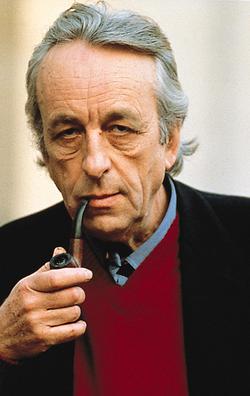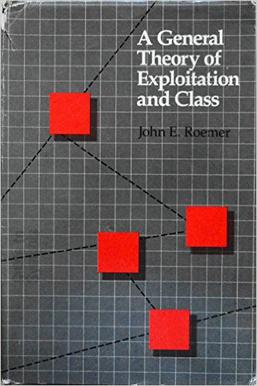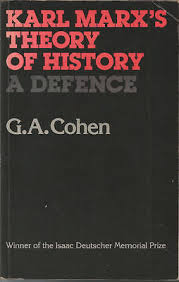
Karl Heinrich Marx was a German-born philosopher, economist, historian, sociologist, political theorist, journalist, critic of political economy, and revolutionary socialist. His best-known works are the 1848 pamphlet The Communist Manifesto and the three-volume Das Kapital (1867–1894); the latter employs his theory of historical materialism in an analysis of capitalism, representing his greatest intellectual achievement. The founder of Marxism, Marx's political and philosophical thought has had enormous influence on subsequent intellectual, economic, and political history.

Louis Pierre Althusser was an Algerian-born French Marxist philosopher who studied at the École normale supérieure in Paris, where he eventually became Professor of Philosophy.

Reading Capital is a 1965 book about the philosopher Karl Marx's Das Kapital by the philosophers Louis Althusser, Étienne Balibar, and Jacques Rancière, the sociologist Roger Establet, and the critic Pierre Macherey. The book was first published in France by François Maspero. An abridged English translation was published in 1970, and an unabridged translation in 2015. The book was influential among intellectuals.
Marxism is a left-wing to far-left method of socioeconomic analysis that uses a materialist interpretation of historical development, better known as historical materialism, to understand class relations and social conflict and a dialectical perspective to view social transformation. It originates from the works of 19th-century German philosophers Karl Marx and Friedrich Engels. As Marxism has developed over time into various branches and schools of thought, no single, definitive Marxist theory exists.
Some Marxists posit what they deem to be Karl Marx's theory of human nature, which they accord an important place in his critique of capitalism, his conception of communism, and his materialist conception of history. Marx does not refer to human nature as such, but to Gattungswesen, which is generally translated as "species-being" or "species-essence". According to a note from Marx in the Manuscripts of 1844, the term is derived from Ludwig Feuerbach's philosophy, in which it refers both to the nature of each human and of humanity as a whole.
Criticism of Marxism has come from various political ideologies and academic disciplines. This includes general intellectual criticism about dogmatism, a lack of internal consistency, criticism related to materialism, arguments that Marxism is a type of historical determinism or that it necessitates a suppression of individual rights, issues with the implementation of communism and economic issues such as the distortion or absence of price signals and reduced incentives. In addition, empirical and epistemological problems are frequently identified.
The theory of historical trajectory is part of Karl Marx's historical materialism. This theory has been analyzed by Erik Olin Wright, whose work has been cited in relation to it.

For Marx is a 1965 book by the philosopher Louis Althusser, a leading theoretician of the French Communist Party (PCF), in which the author reinterprets the work of the philosopher Karl Marx, proposing an epistemological break between the young, Hegelian Marx, and the old Marx, the author of Das Kapital (1867–1883). The book, first published in France by François Maspero, established Althusser's reputation. The texts presented in For Marx are theoretical interventions in a definite conjuncture, particularly aiming at the definition of the lines to be pursued by the PCF after Stalin's years in the Soviet Union. Althusser's position is of theoretical antihumanism, and is against the teleology of history. Althusser defends that history is a process without subject and with an open end, but that has determinations that can be theorized by the science of history as constructed by Marx in his mature work, Das Kapital. Society is then conceptualized as a complex whole articulated in dominance by the economy where several social practices co-exist with a relative autonomy, introducing the concept overdetemination to characterize the levels of effectivity.

Main Currents of Marxism: Its Origins, Growth and Dissolution is a work about Marxism by the political philosopher Leszek Kołakowski. Its three volumes in English are The Founders, The Golden Age, and The Breakdown. It was first published in Polish in Paris in 1976, with the English translation appearing in 1978. In 2005, Main Currents of Marxism was republished in a one volume edition, with a new preface and epilogue by Kołakowski. The work was intended to be a "handbook" on Marxism by Kołakowski, who was once an orthodox Marxist but ultimately rejected Marxism. Despite his critical stand toward Marxism, Kołakowski endorsed the philosopher György Lukács's interpretation of the philosopher Karl Marx.

History, Labour, and Freedom: Themes from Marx is a 1988 book by the philosopher G. A. Cohen.

Making Sense of Marx is a 1985 book about Karl Marx by the social and political theorist Jon Elster, in which the author reevaluates Marx's ideas. The book has received a mixture of praise and criticism from commentators.

A General Theory of Exploitation and Class is a 1982 book about the exploitation of labour and social class by the economist and political scientist John Roemer. The book was first published in the United States by Harvard University Press.
Marxist humanism is an international body of thought and political action rooted in a humanist interpretation of the works of Karl Marx. It is an investigation into "what human nature consists of and what sort of society would be most conducive to human thriving" from a critical perspective rooted in Marxist philosophy. Marxist humanists argue that Marx himself was concerned with investigating similar questions.

Karl Marx's Theory of History: A Defence is a 1978 book by the philosopher G. A. Cohen, the culmination of his attempts to reformulate Karl Marx's doctrines of alienation, exploitation, and historical materialism. Cohen, who interprets Marxism as a scientific theory of history, applies the techniques of analytic philosophy to the elucidation and defence of Marx's materialist conception of history.

Erik Olin Wright was an American analytical Marxist sociologist at the University of Wisconsin–Madison, specializing in social stratification and in egalitarian alternative futures to capitalism. He was known for diverging from classical Marxism in his breakdown of the working class into subgroups of diversely held power and therefore varying degrees of class consciousness. Wright introduced novel concepts to adapt to this change of perspective including deep democracy and interstitial revolution.
Analytical Marxism is an academic school of Marxist theory which emerged in the late 1970s, largely prompted by G. A. Cohen's Karl Marx's Theory of History: A Defence (1978). In this book, Cohen drew on the Anglo–American tradition of analytic philosophy in an attempt to raise the standards of clarity and rigor within Marxist theory, which led to his distancing of Marxism from continental European philosophy. Analytical Marxism rejects much of the Hegelian and dialectical tradition associated with Marx's thought.
Neo-Marxism is a Marxist school of thought originating from 20th-century approaches to amend or extend Marxism and Marxist theory, typically by incorporating elements from other intellectual traditions such as critical theory, psychoanalysis, or existentialism. Neo-Marxism comes under the broader framework of the New Left. In a sociological sense, neo-Marxism adds Max Weber's broader understanding of social inequality, such as status and power, to Marxist philosophy.

György Lukács was a Hungarian Marxist philosopher, literary historian, literary critic, and aesthetician. He was one of the founders of Western Marxism, an interpretive tradition that departed from the Soviet Marxist ideological orthodoxy. He developed the theory of reification, and contributed to Marxist theory with developments of Karl Marx's theory of class consciousness. He was also a philosopher of Leninism. He ideologically developed and organised Lenin's pragmatic revolutionary practices into the formal philosophy of vanguard-party revolution.

History and Class Consciousness: Studies in Marxist Dialectics is a 1923 book by the Hungarian philosopher György Lukács, in which the author re-emphasizes the philosopher Georg Wilhelm Friedrich Hegel's influence on the philosopher Karl Marx, analyzes the concept of "class consciousness," and attempts a philosophical justification of Bolshevism.
Andrew Levine was an American political philosopher and commentator. After acquiring his PhD at Columbia University in 1971, he taught at the University of British Columbia and then at the University of Wisconsin- Madison where he taught for thirty years. In retirement, he served as a research professor at the University of Maryland-College Park and as senior scholar at the Institute for Policy Studies, and he wrote as a news commentator for CounterPunch.org.












